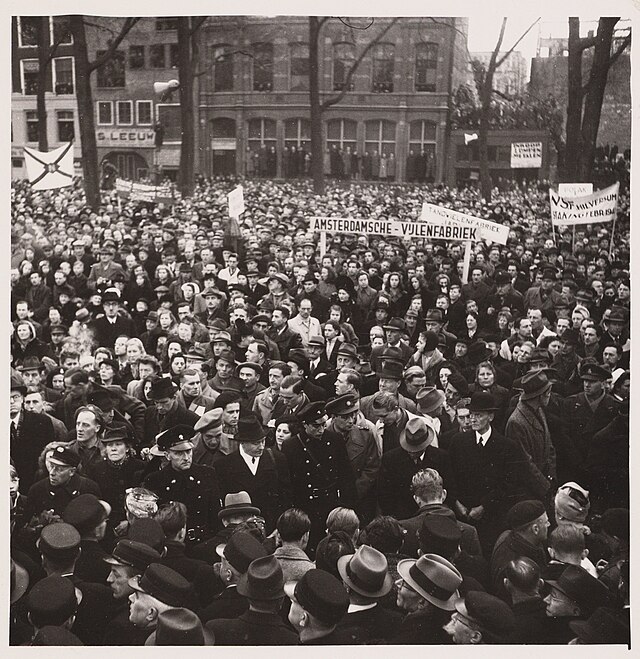Demonstrations in a record number of towns – over 260 – took place on Saturday Feb 11th, on the fourth day of action to defend pensions in France, as the Pensions Bill begins its four-week debate in the National Assembly. The dynamism of the movement is inspiring, but even many strikers think that the government will never back down. So, can Macron be beaten, and if so, how?
Movements of mass revolt are complex, and it’s always extremely difficult to know which movements will accelerate and send the neoliberal government running for cover and which ones will tire and fade, helped along by the determined “moderation” of trade union leaders and a few minor concessions.
The present movement to stop Macron’s plan to increase the standard retirement age from 62 to 64 certainly has much to inspire anti-capitalists across the globe. “The biggest movement for over thirty years” according to one union leader – that is, since a month-long strike wave in 1995, in which the Paris metro and the French railway network were shut down for weeks on end. That struggle ended in victory when Prime Minister Juppé abandoned his attack on retirement rights in disarray .
At least two million people were on the streets this Saturday 11th February, following the mass one-day strike of Tuesday 7th February. Over 260 towns held protests, including places like Avesnes sur Hepe, which has only 4 000 inhabitants. On a previous day of action, on the 31st January, the town of Guéret in the centre of France had a particularly impressive turnout: 4 300 people demonstrated, out of a population of only 13 700! And Guéret is not an isolated case.
Some workplaces, in particular oil refineries, electricity services and docks, have been going further than the official national union strategy of a weekly day of action. The docks of Le Havre (second largest port in France) and Lorient were blockaded by strikers all week, while electricity workers in a number of regions refused to cut off electricity to families who couldn’t pay, and put hospitals and similar services on cheap rate electricity. “It’s not legal, but it’s moral” said a local leader.
On Saturday 11th, Air Traffic Controllers at Paris Orly airport called a wildcat strike to join the movement, and half the day’s flights were cancelled. Some factories in private industry, such as Mecachrome in Toulouse, are striking for two hours every day. In the Louvre museum, workers posed with a banner front of Delacroix’s well-known work “Liberty leading the people”, while at the annual classical music prizegiving “Victoires de la musique” one of the musicians gave a much-applauded speech about the importance of defeating Macron’s attack.
Young people are getting more involved in the rebellion, too. This week there were occupations or blockades in universities in Paris, Toulouse, Montpellier, Lille, Clermont, Grenoble and Mulhouse.
General strike?
Under great pressure from the rank and file, some union leaders are acting more radical than usual, but they are sticking with the extremely risky strategy of building up a strike movement very slowly, with strikes of one day a week. Union leaders are promising wider and longer strike action in a month’s time. But there is a real danger that workers will be demoralized by regularly losing a day’s wages without seeing a dynamic, urgent and fast-moving movement which can obviously win. The national joint union statement on Saturday morning declared they intended “to shut France down on the 7th of March” if the government did not retreat. The careful wording was intended to keep the less combative CFDT on board. CFDT leaders immediately went on to say that in their view this was not a call for a general strike. The more radical CGT leaders said that each workplace will decide how long strike action would go on. Many in the movement think that “General Strike now!” would have more chance of victory.
The union leaders’ official excuse is that the movement is popular, and they do not want to risk its popularity by striking during school holidays, which have just begun and are staggered by region over the next month. This argument is always shaky – public opinion does not really do much to defend workers’ conditions. If this were the case, nurses, who are very popular indeed, would be the best paid and best treated of employees! In the present case, it is particularly ridiculous. Over 85% of those who have not yet retired support the movement, and this number has risen over the last three weeks! Sixty-six per cent of the entire population believe that “if the country is blockaded by the strikes the government is mainly responsible”. And only 21% of the population think that the present movement “will quickly run out of steam”.
In the French workers’ movement, there is something called the “renewable strike” which means that strikers meet every day or two and decide whether to continue striking for another 24 or 48 hours. The advantage of this method is that rank and file workers are involved in the discussions, and national trade union leaders no longer control the revolt so much. The disadvantage is that it can lead to workplaces deciding each on their own, with no one putting forward a determined national strategy. How workers are won to renewable strikes, and the links made between the different sectors, will be key to victory.
Political parties
Political parties of left and right are being tested by the revolt. Left wing groupings such as the France Insoumise (FI) and the New Anticapitalist Party have been organizing mass meetings around the country, and on television and in parliament France Insoumise MPs (there are 74 of them) have been loudly defending the movement. Although the main long-term strategy of the FI is to win radical change through parliament, they have made it clear that the strike movement is key. Interviewed by BFMTV on Saturday, FI leader Jean-Luc Mélenchon declared “Mr Macron treats people like cattle… but people entering into the struggle are entering into dignity.” In parliament, Rachel Keke, a Black FI MP who worked for many years as a cleaner before becoming MP, tore strips off Macron; “You have no right to bring to their knees those people who keep France on its feet!” she declared. On Sunday 12th February, the France Insoumise is organizing a seven-hour-long online event, in order to raise money for union strike funds. Nevertheless, the FI leadership maintains, sadly, the old idea that it is for union leaders, not political leaders, to put forward a strategy for winning.
Prime Minister Elizabeth Borne has made tiny concessions in order to get the votes in parliament of the traditional right-wing Republican party. She promises that the five per cent of retirees who started work young will be able to stop at 63, not 64. The Republicans are worried though – huge demos even in their traditional strongholds prey on their minds.
As is generally the case, a rise in class struggle is very bad news for the fascists. 84% of those who voted for the far-right Rassemblement National (RN) in recent elections support the movement, but the RN and its 87 MPs dare not show themselves openly on the demonstrations for fear of being thrown off. But they have been flyposting “No to Macron’s Pensions Reform – join the RN!” posters along the demonstration routes. Marine le Pen, their leader, does not call for people to go on the streets, and in parliament the RN are reduced to appealing to their hardcore extremists, claiming that stopping immigration would save money to pay for pensions, and that the solution is for white French people to have larger families, encouraged by the state. They are being forced to show how far they stand from working-class interests.
Further days of mobilization have been called for the 16th February and for the 7th March, and some sectors such as the Paris metro have already announced renewable strikes from the 7th March on. Macron can be beaten, if the movement does not listen too much to the professional negotiators at the top of the trade union confederations.




